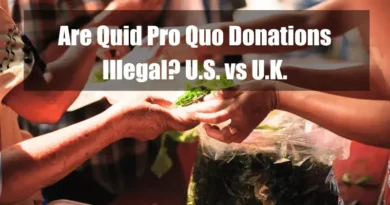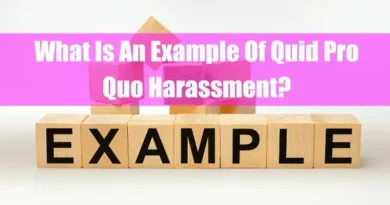What is the Quid Pro Quo Definition? Real-life Examples
Quid pro quo is a Latin phrase that translates to “something for something.” It refers to exchanging goods, services, or favors where one party provides something in return for something else. This concept can be applied in various contexts, including business, politics, relationships, etc. The key aspect of a quid pro quo arrangement is the mutual benefit derived from the exchange. Legal and ethical discussions often involve considerations of fairness, consent, and potential abuse of power.
When quid pro quo is unethical, it refers to an exchange where the terms involve coercion, exploitation, or abuse of power, leading to unfair or harmful outcomes. In such cases, one party takes advantage of their position to demand something of value in return for a favor or service that should not be contingent on such an exchange. This often results in a lack of genuine consent and can violate ethical, legal, or professional standards.
Takeaways
| Key Points |
|---|
| Quid pro quo, a Latin phrase meaning “something for something,” refers to an exchange where one party provides goods, services, or favors in return for something of equivalent value. |
| While ethical applications include business partnerships (e.g., a bakery supplying a café in exchange for promotions), skill exchanges, or academic collaborations, unethical quid pro quo arises in situations involving coercion, exploitation, or abuse of power. |
| For example, workplace harassment, political corruption, or bribery demonstrates how these exchanges can undermine trust, fairness, and societal integrity. |
| Real-life examples of ethical quid pro quo include companies offering scholarships for future work commitments, nonprofits sharing resources, or professional networking between industry veterans and newcomers. |
| Conversely, unethical cases, such as doctors prescribing medications for kickbacks or politicians accepting bribes, highlight the critical importance of maintaining ethical and legal standards to ensure fairness and prevent harm. |
Ethical Quid Pro Quo Real-life Examples
Here are the Key Takeaways for Ethical Quid Pro Quo Real-life Examples:
| Context | Ethical Quid Pro Quo Example |
|---|---|
| Business Partnerships | Local bakery supplies café; café promotes bakery. |
| Academic Collaboration | Researchers exchange datasets and expertise. |
| Volunteer Services | Law student offers free advice for mentorship. |
| Skill Exchange | Graphic designer and web developer trade services. |
| Event Sponsorship | Business sponsors sports event for advertising. |
| Educational Incentives | Scholarships for future work commitment. |
| Networking | Veteran introduces newcomer for project assistance. |
| Resource Sharing | Non-profits share office space and resources. |
| Community Projects | Company builds playground for tax breaks. |
| Professional Training | Employee trains colleagues for extra vacation days. |
Let’s discuss each:
1. Business Partnerships: A Bakery and Café Collaboration
In the competitive landscape of local businesses, symbiotic relationships can yield significant benefits. Consider the example of a local bakery that agrees to supply a nearby café with fresh pastries daily. In return, the café promotes the bakery to its customers.
This exchange fosters a mutually beneficial partnership where both businesses experience increased sales and enhanced brand recognition. The bakery gains a steady customer in the café, ensuring consistent revenue. In contrast, the café can offer high-quality, fresh products that attract more patrons. Such partnerships exemplify how strategic collaborations can elevate small businesses, driving mutual growth and community engagement.
2. Academic Collaboration: Researchers Sharing Resources
Academic institutions thrive on collaboration and resource sharing. For example, two researchers from different universities might collaborate on a study, with one providing access to a unique dataset and the other offering expertise in data analysis.
This exchange allows both parties to leverage their strengths, resulting in high-quality research outputs. The collaboration enhances the research’s credibility and accelerates scientific progress by combining resources and knowledge. This scenario underscores the value of academic cooperation, where sharing and specialization lead to groundbreaking discoveries and advancements in various fields.
3. Volunteer Services: Law Student and Attorney Mentorship
Volunteer services often involve exchanges that benefit both the volunteer and the recipient. A law student, for instance, might offer free legal advice at a community center in exchange for mentorship from an experienced attorney. The community benefits from accessible legal assistance, and the student gains practical experience and professional guidance.
This arrangement highlights the ethical quid pro quo in volunteerism, where the exchange fosters personal growth, professional development, and community service. Such engagements are vital for building a supportive and skilled society.

4. Skill Exchange: Graphic Designer and Web Developer
In creative industries, professionals often barter their services to meet their needs without financial transactions. For example, a graphic designer and a web developer might agree to exchange services—one creating a logo while the other building a website.
This arrangement allows both professionals to obtain necessary services they might otherwise be unable to afford. By trading their expertise, they build a professional network and enhance their portfolios, showcasing the practical benefits of skill exchanges in fostering innovation and cooperation within the creative sector.
5. Event Sponsorship: Local Business and Community Sports
Sponsorship deals are another form of ethical quid pro quo. A local business might sponsor a community sports event in return for advertising space.
This sponsorship provides the event with the necessary funding while offering the business valuable exposure to potential customers. Such arrangements benefit the community by enabling events that promote health and social cohesion. At the same time, businesses gain marketing opportunities that might lead to increased patronage. This mutually advantageous relationship illustrates how sponsorship can be a strategic tool for community development and business growth.
6. Educational Incentives: Company Scholarships
Educational incentives often involve ethical exchanges that benefit both students and organizations. For example, a company might offer scholarships to students who commit to working for it for a set period after graduation.
This arrangement provides financial assistance to students, making education more accessible. In return, the company secures a pipeline of trained and loyal employees. This scenario highlights how educational incentives can address workforce needs while supporting students’ academic and professional aspirations, fostering a future-ready workforce, and promoting higher education.
7. Networking Opportunities: Industry Veteran and Newcomer
Networking is crucial in professional growth and often facilitated through ethical quid pro quo arrangements. For example, an industry veteran might agree to introduce a newcomer to key contacts in exchange for assistance with a project.
This exchange helps the newcomer build a professional network, which is essential for career advancement, while the veteran benefits from the additional help. This arrangement underscores the importance of networking and mentorship in professional development, where mutually beneficial relationships drive career growth and industry innovation.

8. Resource Sharing: Non-Profits
Non-profit organizations often operate on limited budgets, making resource-sharing a practical strategy. Two non-profits might agree to share office space and resources to reduce operational costs.
This arrangement allows both organizations to allocate more funds to their missions, enhancing their impact. By sharing resources, non-profits can maximize their efficiency and effectiveness, demonstrating how ethical quid pro quo arrangements can support charitable goals and community services.
9. Community Projects: Construction Company and Tax Breaks
Community projects often involve exchanges between private entities and local governments. For example, a construction company might agree to build a playground for a neighborhood in return for a tax break.
This arrangement benefits the community by providing a new recreational facility while the company gains financial incentives. Such exchanges illustrate how public-private partnerships can address community needs and support local development, fostering a collaborative approach to social and economic progress.
10. Professional Training: Employee and Employer
Professional development often involves quid pro quo arrangements in the workplace. For example, an employee might agree to train colleagues in exchange for extra vacation days.
This arrangement benefits the organization by enhancing the skills of its workforce, leading to increased productivity and efficiency. The employee, in turn, enjoys additional time off, promoting work-life balance. This example highlights how ethical exchanges in the workplace can support professional growth and employee satisfaction, contributing to a positive and productive work environment.
Unethical Quid Pro Quo Real-life Examples
Here are the Key Takeaways for Unethical Quid Pro Quo Real-life Examples:
| Context | Unethical Quid Pro Quo Example |
|---|---|
| Workplace Harassment | Manager demands sexual favors for promotion. |
| Political Corruption | Politician accepts bribes for favorable laws. |
| Educational Misconduct | Professor exchanges grades for personal favors. |
| Legal Manipulation | Judge reduces sentence for bribe. |
| Healthcare Fraud | Doctor prescribes meds for kickbacks. |
| Real Estate Corruption | Developer bribes for zoning approvals. |
| Financial Misconduct | Investor gives kickback for insider info. |
| Media Bias | Journalist writes favorably for incentives. |
| Corporate Bribery | Executive accepts bribes for procurement. |
| International Diplomacy | Diplomat offers concessions for personal gain. |
Let’s discuss each:
1. Workplace Harassment: Manager and Employee
Unethical quid pro quo often manifests in power imbalances, such as workplace harassment. For example, a manager might promise an employee a promotion in return for sexual favors.
This coercive arrangement exploits the employee’s vulnerability and creates a toxic work environment. Such actions are illegal and morally reprehensible, leading to severe legal and reputational consequences for the perpetrators and the organizations involved. This example highlights the importance of addressing power abuses and maintaining ethical standards to protect employee rights and well-being.
2. Political Corruption: Politician and Business Bribes
Political corruption is a common form of unethical quid pro quo. For example, a politician might accept bribes from a company in exchange for favorable legislation.
This corrupt practice undermines the democratic process and erodes public trust in government institutions. It prioritizes private gain over public interest, leading to policies that may harm the community. Such corruption can have far-reaching impacts, including economic disparity and social injustice, illustrating the critical need for transparency and accountability in governance.
3. Educational Misconduct: Professor and Student
In academic settings, quid pro quo can become unethical when it involves misconduct. For example, a professor might offer students better grades in exchange for personal favors.
This arrangement compromises the integrity of the educational system, devaluing academic achievements and eroding trust between students and educators. It creates an unfair advantage and can negatively affect the student’s career and academic reputation. Fairness and ethical standards in education are essential for fostering a just and equitable learning environment.

4. Legal Manipulation: Judge and Defendant
Unethical quid pro quo in the legal system can lead to miscarriages of justice. For example, a judge might reduce a defendant’s sentence in exchange for a bribe or personal favors.
This corrupt practice undermines the legal system’s integrity, leading to unjust outcomes and eroding public confidence in judicial institutions. It demonstrates the critical need for impartiality and ethical conduct in the legal profession to uphold the rule of law and ensure justice for all.
5. Healthcare Fraud: Doctor and Pharmaceutical Company
In healthcare, unethical quid pro quo can have dire consequences for patient safety and public health. For example, a doctor might prescribe a particular medication in exchange for kickbacks from a pharmaceutical company.
This practice prioritizes financial gain over patient care, potentially leading to inappropriate treatments and adverse health outcomes. It highlights the importance of maintaining ethical standards in healthcare to protect patients and ensure the integrity of medical practices.
6. Real Estate Corruption: Developer and City Official
Real estate transactions can involve unethical exchanges, such as a developer offering a city official a bribe in return for zoning approvals.
This corrupt practice can lead to unchecked urban development, compromising city planning and community welfare. It prioritizes private interests over public good, often resulting in environmental degradation and social inequality. Ensuring transparency and ethical conduct in real estate dealings is crucial for sustainable and equitable urban development.
7. Financial Misconduct: Investor and Broker
In the financial sector, unethical quid pro quo can involve insider trading or fraudulent schemes. An investor might offer a broker a kickback in exchange for confidential information.
This practice undermines market integrity and can lead to significant financial losses for other investors. It exemplifies the importance of ethical standards and regulatory oversight in maintaining fair and transparent financial markets.

8. Media Bias: Journalist and Politician
Unethical quid pro quo can also manifest in media practices. A journalist might agree to write favorable articles about a politician in exchange for exclusive stories or financial incentives.
This compromises journalistic integrity and misleads the public, undermining the media’s role as a watchdog for democracy. It highlights the need for ethical journalism to ensure accurate and unbiased reporting.
9. Corporate Bribery: Executive and Supplier
Corporate bribery is a common form of unethical quid pro quo. An executive might accept gifts or money from a supplier in exchange for preferential treatment in procurement processes.
This corrupt practice distorts competition and can lead to inferior products or services. It underscores the importance of ethical business practices and transparent procurement processes to ensure fair competition and quality standards.
10. International Diplomacy: Diplomat and Foreign Government
Unethical quid pro quo in international diplomacy can involve secret deals and coercive tactics. A diplomat might offer concessions or favorable terms to a foreign government in exchange for personal gains or political favors.
This undermines international relations and can lead to conflicts and mistrust between nations. Ethical conduct in diplomacy is essential for maintaining global stability and fostering cooperation.
Conclusion
Quid pro quo arrangements can be ethical or unethical, depending on the exchange’s context and nature. Ethical quid pro quo fosters mutual benefits and promotes cooperation, innovation, and growth. In contrast, unethical quid pro quo exploits power imbalances, undermines integrity, and can lead to significant harm and injustice. Understanding the distinctions and implications of these arrangements is crucial for fostering ethical practices in various domains, ensuring that interactions and transactions are fair, just, and beneficial for all parties involved.









